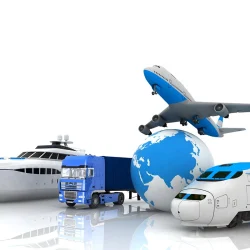Advantages of Road Freight
2024-05-30
Road freight involves the transportation of goods by road using various types of trucks and trailers. It is a key component of the logistics and supply chain industry, providing flexibility and direct delivery options. Here’s a comprehensive overview of road freight, including its types, advantages, and key considerations:
Types of Road Freight
1. Full Truckload (FTL): This service involves transporting large shipments that fill an entire truck. It’s ideal for large quantities of goods or when a single customer needs exclusive use of the truck.
2. Less Than Truckload (LTL): LTL shipping combines shipments from multiple customers in a single truck. This is cost-effective for smaller shipments that don’t require a full truck.
3. Parcel Delivery: This involves the transportation of small packages and parcels, typically handled by courier services.
4. Specialized Freight: This includes the transportation of goods that require special handling, such as hazardous materials, oversized loads, and temperature-sensitive products.
5. Express and Same-Day Delivery: For urgent shipments, these services guarantee delivery within a very short time frame, often within the same day.
6. Dedicated Contract Carriage: This service provides dedicated trucks and drivers for a specific client, often on a long-term contract basis.
Advantages of Road Freight
1. Flexibility: Road freight offers unmatched flexibility in terms of routes, schedules, and delivery points. It can reach locations that are inaccessible by rail, air, or sea.
2. Speed: For short to medium distances, road freight is typically faster than other modes of transport, especially when direct delivery is possible without the need for transshipment.
3. Cost-Effective for Short Distances: For short and medium distances, road freight can be more economical compared to air or rail.
4. Door-to-Door Service: Road freight provides direct delivery to the consignee’s door, reducing handling and potential damage to goods.
5. Accessibility: With an extensive network of roads, trucks can deliver goods to both urban and rural areas.
Key Considerations for Road Freight
1. Vehicle Selection: Choosing the right type of truck or trailer based on the nature, size, and weight of the cargo is crucial.
2. Regulations and Compliance: Adhering to local and international regulations, including weight limits, safety standards, and environmental laws, is essential.
3. Driver Shortages: The industry often faces shortages of qualified drivers, which can impact delivery schedules and costs.
4. Fuel Costs: Fluctuations in fuel prices can significantly affect the cost of road freight services.
5. Infrastructure: Road conditions, traffic congestion, and infrastructure quality can impact transit times and safety.
6. Technology and Tracking: Implementing GPS tracking, route optimization software, and electronic logging devices (ELDs) improves efficiency, transparency, and compliance.
7. Insurance: Ensuring that cargo is adequately insured to protect against loss, theft, or damage during transit.
Trends and Future of Road Freight
1. Sustainability: There is an increasing focus on reducing emissions through the use of electric and hybrid trucks, as well as alternative fuels like LNG (liquefied natural gas) and hydrogen.
2. Autonomous Vehicles: Development and testing of autonomous trucks could revolutionize road freight by improving efficiency and reducing labor costs.
3. Digitalization: Advanced technologies such as IoT (Internet of Things), big data analytics, and AI are being integrated to enhance route planning, predictive maintenance, and cargo tracking.
4. E-commerce Growth: The rise of e-commerce is driving demand for efficient and reliable road freight services, particularly for last-mile delivery.
5. Urban Logistics: With increasing urbanization, there is a focus on improving logistics solutions for dense urban areas, including the use of smaller, more maneuverable delivery vehicles.
6. Intermodal Solutions: Combining road freight with other modes of transport (rail, sea, air) to create efficient and cost-effective intermodal logistics solutions.
Conclusion
Road freight is an indispensable part of the global logistics chain, offering flexibility, speed, and direct delivery. By staying abreast of industry trends and continuously improving infrastructure and technology, road freight companies can enhance their services and meet the evolving needs of the market.



